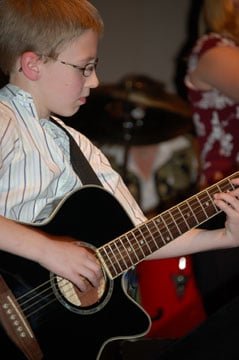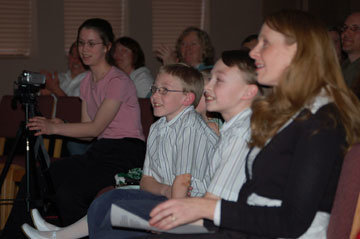[et_pb_text admin_label="Chris Fitzgerald byline; remember to tag post as various-contributors" saved_tabs="all" background_layout="light" text_orientation="left" header_font="Arimo||||" text_font="||on||" use_border_color="off" border_color="#ffffff" border_style="solid"]
Josh Loux was 10 years old last September. Not too many years ago, that decade might have been an entire lifetime: Josh is one of 30,000 young Americans living with Cystic Fibrosis, a life-threatening genetic disease that affects the lungs and digestive system. On April 20, his family held a second celebration of his life to raise awareness for another milestone: the 10-year anniversary of the Gig Harbor “Great Strides” fundraising walk for the CF Foundation Washington/Alaska Chapter, coming up in mid-May.
 Ten year old Josh Loux plays his guitar at the celebration of life held in his honor in April. Photo by Mindi LaRose
Ten year old Josh Loux plays his guitar at the celebration of life held in his honor in April. Photo by Mindi LaRose
Josh was 3 months old before his parents, John and DeeDee, had a name for his distress. They knew something was wrong. Josh wasn’t growing; he weighed only a few ounces more at 3 months than he did when born full-term, and still wore newborn clothing. He cried all the time and was fussy. After diagnosis, he was placed on a series of daily treatments and medications that will continue throughout his life, and his body weight and development “all averaged out by age 1.” The Louxes already had one son, Christopher, who was a healthy 2-year-old.
CF, as the family calls Josh’s condition, changed everything, says DeeDee. She and John had planned to have a large family. While testing their baby and the parents to find answers, doctors discovered John and DeeDee carry a gene for the disease. They are among more than 10 million Americans who are symptomless carriers of the defective CF gene. (While progress has been made, there is no cure for this fatal devastating disease.) There was no history of CF in either family, yet any child they conceived would have a one in four chance of having the same disease. Daughter Aleisha was born healthy three years later.
DeeDee says the family has a “new normal”: daily treatments, medications, and more doctor and hospitalizations for ailments that wouldn’t much slow other youngsters down. This year, Josh is going to school; his brother and sister are still home-schooled. DeeDee’s intuition, and Josh’s behavior, told her he needed some breathing room — she was mom, nurse, teacher, pharmacist. School “has been wonderful for him,” she says. During a recent hospitalization, classmates sent him cards. Josh insisted on a post-hospital visit to school before spring break to thank his friends.
 About 200 family members and friends joined Josh at the event, which also raised awareness for a May Cystic fibrosis fundraising walk. Photo by Mindi LaRose
About 200 family members and friends joined Josh at the event, which also raised awareness for a May Cystic fibrosis fundraising walk. Photo by Mindi LaRose
Josh is nearly the shortest kid in his third-grade class at Hosanna Christian School in Gig Harbor, except for one smaller girl who wears high-heeled shoes to make herself taller. That makes Josh the shortest by default — and his good third-grade friend, Austin, is the tallest. These important distinctions are not lost on Josh. When asked what he like most about school, he quickly named math — and food. He reports he eats his own lunch, goes back for seconds, and takes any classmate leftovers offered.
“I eat a lot,” he says, fidgeting with his stocking feet on the edge of the coffee table in front of the sofa where he sits, “and I still never grow.” DeeDee says Josh takes pills before every meal to help his body retain nutrients, and reminds him he has grown two inches since last December. “No,” he corrects softly, still studying his toes, “Just one and one half inches.”
“I feel different,” Josh says, unable to explain how. He longs to be just a boy who plays outside before school, who needn’t “waste my time” with treatments. In another life, this wiry, plucky kid with a first-class pitching arm (and trophies from three years running to prove it) would probably have other kids lined up to paint the fence while he whistled off with a fishing pole. Instead, he gets up an hour early every morning, plugs two hair-dryer type hoses attached to a small machine into a black nylon vest. He slips the vest on over his pjs, fastens the front snug with two straps and flips the machine on. Like an inflatable scuba vest, the device fills with air and hugs his chest and back. While he watches a video or plays a game and wears a medicated nebulizer mask, the activated vest pulsates against his body, “jiggling” his chest and back to give up the mucus that collected in his lungs overnight. Every morning. Then pills with breakfast. Nothing he wants to share with classmates during recess.
When DeeDee was pregnant with Josh, she became reacquainted with a classmate at her high school reunion. There was something “different” about this friend while they were in school; she coughed a lot, missed classes. Turns out her friend, now married and on a career track, has CF. DeeDee asks her advice occasionally; the two have something in common — one leading a full life and beating the average life-expectancy odds, with a disease doctors told her parents would bury her before kindergarten, the other raising a son to “work hard and take care of himself.”
Josh’s family is honest with him. They talk about the hard things; mostly they tell him there are no guarantees — for anyone.
CF kids live with tangible isolation and experience the kind of loneliness that comes from being “the only one,” because CF people don’t congregate. There are no “camps” for CF kids, no special events where they mingle. In a cruel twist, bad bacteria from one strain can be communicated from one affected person to another affected person, and the result is more sickness that cannot be reversed. When parents of CF kids occasionally attend network functions, their children are not present. In their “new normal,” DeeDee says they tell Josh, “CF is a part of your life; it’s not your whole life.”
Doctors now know the more active CF kids are, the better — the more their lungs get a healthy workout, the longer they retain the capacity. It is information that Josh regularly puts to the test. If he could meet another kid with CF, he knows what he would ask: “How many times are you ‘doing the vest?’” It is a question that connects the dot back to “different.” Josh wonders how another kid would fit the vest treatment in — he is eager to be just a kid growing up, throwing fastballs, drawing, playing his guitar. Way too busy to be bothered with CF.
UNDERWRITTEN BY THE FUND FOR NONPROFIT NEWS (NEWSMATCH) AT THE MIAMI FOUNDATION, THE ANGEL GUILD, ADVERTISERS, DONORS AND PEOPLE WHO SUPPORT INDEPENDENT, NONPROFIT LOCAL NEWS